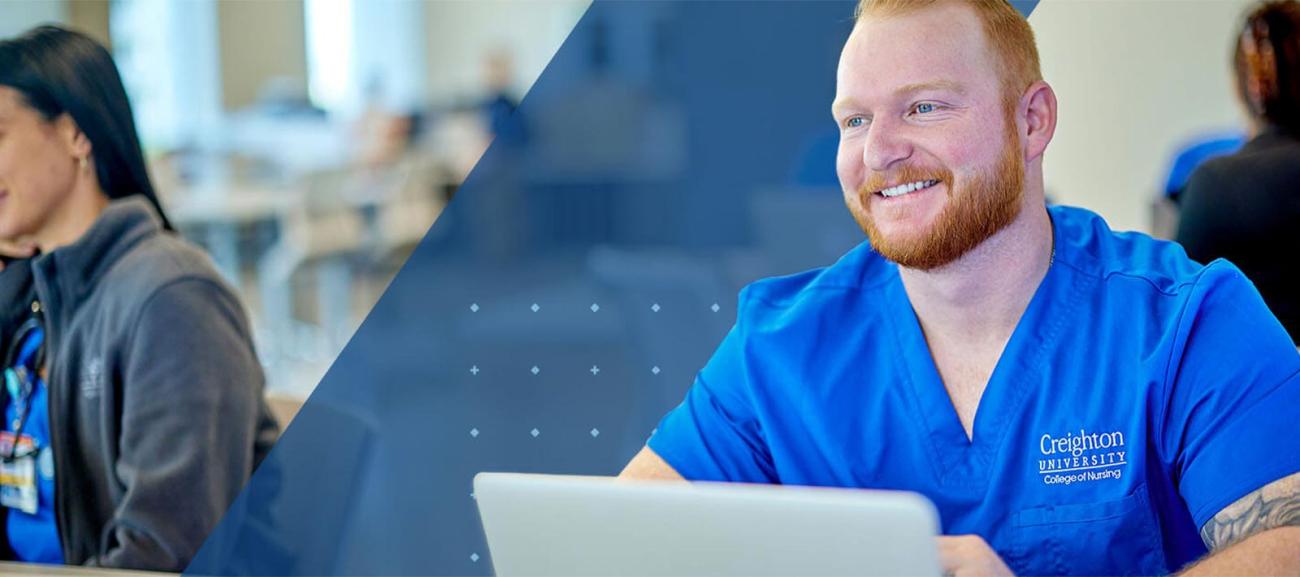
How to pursue nursing as a second career

It’s not uncommon to reevaluate your professional goals mid-career. In fact, around 53 percent of Americans who quit their job in 2021 entered into an entirely new field of work soon after.
Whether you’re looking for work that feels more fulfilling or you’re simply interested in increased opportunities for advancement, the decision to shift your career pursuits toward nursing comes with a range of exciting prospects. Demand for high-quality nurses is consistently high in the U.S., and nursing has been ranked the most trusted profession in the country for 21 consecutive years, according to a 2023 Gallup Poll.
If you’re eager to forge a new path for yourself in this field, join us as we outline how to pursue nursing as a second career in as little as one year, with expert insights from Dr. Heather Naylor, faculty chair for Creighton University’s Phoenix ABSN program. As a Creighton ABSN graduate herself, Dr. Naylor has firsthand experience on the topic.
How to become a second-career nurse
The U.S. nursing shortage has intensified as Baby Boomers age and demands for medical services has increased. The need for quality healthcare continues to grow rapidly.
“As the demand for healthcare continues to rise, so does the critical need for qualified nursing professionals,” Dr. Naylor says. “With a widening gap, it’s imperative that we do whatever we can to address this shortage now.”
Adequate staffing of nurses is a critical element of safe patient care — not only relating to the number of nurses but also the level of education. A growing body of research suggests that baccalaureate-prepared nurses contribute to lower mortality and failure-to-rescue rates among those receiving medical treatment.
You can help fill that gap with your goal of pursuing a career change to nursing. As you prepare for the journey ahead, you’ll want to keep the following steps in mind.
1. Consider your nursing degree options
There are three general degree paths you can take to become a registered nurse (RN): a Bachelor of Science in Nursing (BSN), an associate degree in nursing (ADN) or a diploma from an approved nursing program. In all three cases, you must obtain licensure before you’ll be able to practice as an RN.
In weighing the options, many consider the time to completion to be a top priority.
It’s true that earning your nursing degree faster with an ADN or a nursing diploma can get you in those scrubs and treating patients sooner. But keep in mind that while you don’t need a bachelor’s degree to become an RN, many healthcare facilities are pushing for additional BSN-qualified nurses. In fact, there’s been a longstanding nationwide initiative to employ more BSN-RNs.
Earning a BSN can also be a more versatile option, as it paves the way for advancement opportunities later on. And it’s good to consider that once you gain some active nursing experience, you might eventually want to pursue administrative, research, consulting or teaching positions.
If you’ve already earned a bachelor’s degree in a different field, don’t overlook Accelerated Bachelor of Science in Nursing (ABSN) degree opportunities — these programs were designed with professionals like you in mind, building upon your past education and experiences. This option can help you avoid the unnecessary repetition of courses you’ve already taken, and can often be completed in as little as 12 months.
“Our accelerated students get in, get out and get jobs,” Dr. Naylor says. “They know what they want and are dedicated to working hard, bringing their unique skills and life experiences that position them to be nurse leaders on their units once they graduate.”
Finally, for those who opt to earn a nursing diploma or an ADN to get their start in the field, there are also RN-to-BSN bridge programs to help you advance efficiently if you do choose to pursue a bachelor’s degree later on.
2. Complete a high-quality nursing program
To become eligible to sit for your eventual licensure exam, it’s crucial that you attend an accredited nursing program. The two primary accrediting bodies for U.S. nursing programs are the Commission on Collegiate Nursing Education (CCNE) and the Accreditation Commission for Education in Nursing (ACEN).
Other important elements to look for in a top nursing program include strong graduate pass-rates on the National Council Licensure Examination (NCLEX), a dynamic curriculum and opportunities for specialization that align with your nursing career goals.
The ABSN program at Creighton University, for example, is one of the most successful, longest-running ABSN programs in the nation, having been ranked in the top eight percent by U.S. News and World Report. In fact, Creighton nursing grads experience a 91 percent first-time NCLEX pass rate.
In addition to courses in anatomy, physiology, microbiology, psychology and social/behavioral sciences, the robust curriculum includes important competencies like critical thinking, ethical decision-making, clinical judgment, professional accountability and professional communication skills.
“Creighton graduates get jobs right away because the nursing program is well respected, so our graduates are well respected,” Dr. Naylor explains. “Our NCLEX pass rates are excellent year in and year out because we have a time-tested curriculum and exceptional faculty.”
The ABSN program at Creighton also offers six distinct clinical specialties with more than 900 clinical hours for students to pursue:
- Critical Care
- Community and Population Health
- Labor and Delivery/Obstetrics
- Medical-Surgical
- Pediatrics
- Psychiatric and Mental Health
Ultimately, determining which nursing program will be the best fit for you will depend on your personal career goals and lifestyle needs. But as long as you’re selecting an accredited program with a well-rounded curriculum, you can feel confident in the training you’ll receive as a nursing student.
3. Obtain your nursing license
Regardless of the degree path you choose, you’ll need to become licensed before you can begin working as an RN. The NCLEX is an exam used to determine whether recently graduated nursing students are adept in all the competencies required to practice. It is administered electronically and test-takers have a maximum of six hours to complete it.
The exams you’ll take while in nursing school are primarily knowledge-based. Conversely, you can expect the NCLEX to test the application and analysis of the knowledge you learned in your nursing program.
To ensure RNs can make quality nursing judgments and provide safe patient care, the NCLEX is designed to test prospects’ critical-thinking skills using information they learned in their nursing programs. Subjects covered include the following:
- Safe and effective care environment
- Health promotion and maintenance
- Psychosocial integrity
- Physiological integrity
By obtaining a passing score on the NCLEX, you’ll be eligible for licensure as an RN. If you don’t obtain a passing score, you can re-test after 45 days. Do note, however, that you’ll be expected to pay a $200 fee each time you sit for the exam. And you may have to pay additional licensure fees that are determined by individual State Boards of Nursing.
4. Participate in post-graduate training, if applicable
Depending on the type of nursing position you hope to pursue, you may be ready to practice immediately after passing the NCLEX and obtaining your nursing license. If you’re planning to work in a specialty area of nursing, however, there might be a bit more training for you to complete.
Those looking to work in ambulatory care, gerontology or pediatrics, for example, may need to obtain specialty certification. Not all employers require this, but even voluntary certification can help demonstrate adherence to a specific level of competency in your specialized area of practice. Details of the certification process will vary depending on your specialty, so be sure to research accordingly.
Navigate your journey to becoming a nurse
If you’re ready to reinvigorate your career pursuits, there’s no better time to change directions by becoming a second-career nurse. With more than 100 different nursing specialties and ample opportunities for advancement with post-baccalaureate education and certification options, there will always be something new for you to explore in the world of nursing.
If you’ve already earned a bachelor’s degree in a different field, pursuing nursing as a second career is more effective than ever with accelerated degree options. The full-time ABSN program at Creighton University enables baccalaureate-qualified students to earn a BSN in just 12 months. Compare this to the typical four-year timeline of a traditional BSN program, and it’s clear why this has become a more attainable option for second-career nurses.
Consider this final word of advice from Dr. Naylor:
“It’s never too late to make a career change. You won’t regret the job satisfaction, variety and advancement opportunities that come with a career in nursing. It opens so many doors!”
If you’re ready to take the first step toward a fulfilling new career, visit Creighton’s Accelerated Bachelor of Science in Nursing program page to learn more about your options.












